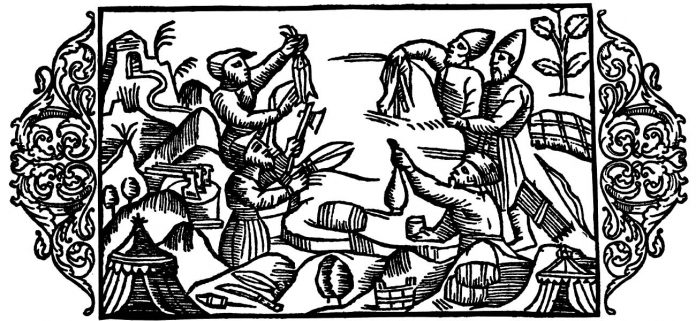This article is written by Shreya Bajaj, pursuing a Certificate Course in Advanced Corporate Taxation from LawSikho.com. Here she discusses “How Barter Transactions (Goods in Exchange of Goods) are Taxed”.
Introduction
Before delving into the tax considerations of a barter transaction, it is essential to lay down what exactly a barter transaction is. In layman terms, it is goods in exchange of goods. In its purest sense, it consists of two essentials:
- Direct exchange of the respective goods or services
- Lack of use of money
Barter transactions are generally thought to be in use before currency evolved into use. However, barter is in vogue even today, maybe not as an essential mode but as an innovative mode of trade and commerce. For instance, there are various trading exchanges a business with good creditworthiness can enter, and engage in barter with various other businesses dispensing with the use of cash or securities. A business can take goods on offer by another business with points debited and can then attain credit points whenever its own goods on offer are taken by another business on the trading platform. Thus, the limitation of both parties needing to have a mutual interest in their goods is not there in such trading platforms where the balance of credit and debit points maintain equilibrium. Not only this, barter is seen in the cases of promotional offers of exchanging old appliances with new ones at a significant discount. It is also seen in places where one may not really perceive it as barter at the outset. For instance, in certain joint development agreements, or in the case of cryptocurrencies.
Taxation of Barter Transactions
The Parliament and State legislature derive its power to levy taxes from Article 246 of the Constitution and Article 265 provide that there can be no taxation without the authority of law. It means that all taxes need to have a clear legal basis.
Barter transactions can be perceived in two ways:
- A barter transaction generating income
- A barter transaction as an expenditure
Direct tax laws need to be studied for the former and the indirect taxation needs to be considered for the latter.
Goods and Services Tax
The Goods and Services Tax (hereinafter referred to as “GST”), came into effect on 1st July 2017 by virtue of 101st Constitutional Amendment amending the Constitution to give parliament the exclusive power to make laws on interstate trade and commerce in Article 246A. It subsumed various erstwhile indirect taxes within it. For instance, service tax, value-added tax, octroi duty, excise duty all came within the ambit of GST to prevent the cascading effect of taxes, reduce complications and reduce the overall burden of the taxes. GST, as the name suggests, is applicable to both goods and services which contrasts the earlier situation when there were separate taxation systems for services and goods. Thus, barter in goods and barter in services would both be treated the same way.
For any potential taxation, there are certain points to be considered — chargeable event, minimum thresholds, tax rates, registration requirements, and compliances.
While the minimum thresholds, tax rates and procedural formalities are more or less uniform and dependent on numerical values or the kind of entities involved, it is the definition of a chargeable event that holds most significance in case of barter.
Pre GST Scenario
Earlier, under the multitude of state tax laws, the incidence of tax occurred when there was sale in exchange for cash or other valuable consideration. The term “valuable consideration” generally was not considered to include other goods as the principle of ejusdem generis implied that such consideration should be in the nature of cash only. The court also affirmed such a view in the case titled “Sales Tax Commissioner v. Ram Kumar Agarwal” [(1967) 19 STC 400 All] wherein an exchange of gold bullions for ornaments was not considered the sale as per the Sales of Goods act 1930. This doesn’t mean to say that courts were barred from going beyond the provisions to ascertain the real nature of the transactions.
Thus, common practices in various industries ( automobile, consumer durables, handsets), of bartering or exchanging old models for new ones did not attract value-added tax. Vat used to be paid only on the cash component and not the product exchanged. Barter was commonly seen in the real estate industry also, with giving away of free flats/plots for development rights.
Post GST Scenario
With the advent of GST, the above scenario ceases to exist with significant implications for all the industries involved. Under the Central Goods and services tax act 2017 (hereinafter referred to as “GST act”), the taxable event shall be the “supply” of goods or services or both made for consideration in the course of business or the furtherance of it.
1. Scope of Supply
According to section 7(1)(a), supply includes various activities like sale, transfer, license, rental, lease but most significantly, it includes barter and exchange made or agreed to be made for consideration in the course or furtherance of business. Additionally, as per section 2(31) of the GST Act, consideration includes payment made in money or otherwise. Thus, there is no ambiguity in the fact that barters now attract tax on the full value rather than just the cash component.
2. Valuation
Further, once an event of barter triggers taxation, it is essential to understand how a tax on it will be calculated. A tax rate exists but the value of supply indicates on what such a tax rate shall be applied. Generally, each fiscal statute requires tax to be paid on an ad valorem basis. In GST act also, tax is payable on such a basis, i.e, as a proportion of the value of supply of the good or service. Section 15 of the GST act and the “Goods and Services Tax (Determination of Value of supply) rules, 2017” (hereinafter referred to as “The Rules” prescribe how supply is valued as per different circumstances and persons.
“Transaction Value” is the taxable value. This refers to the price actually paid or is payable, provided the parties, the supplier and recipient are not related to price being the sole consideration. That means that if the parties are related (for example, if the parties are in the same family or they are associated enterprises), then the value would be that which would have dictated the transaction had the parties been unrelated. Generally, invoice value is the taxable value. However, for certain specific situations, the Rules have been prescribed. In the value, there are certain compulsory inclusions like taxes, fees, charges levied under any law other than GST law and expenses incurred and there exist certain exclusions as well, like discounts that are a part of trade and commerce.
Transaction Value in Barter Transactions
Rules have been prescribed for situations when consideration is not wholly in money. Rule 27 provides the following values to be taken in a sequence in such a situation:
- Open market value of the supply
- If the open market value is not available, then the total money value plus the money value of the rest of the consideration if such value was known at the time of supply.
- The value of supply of goods and services of like quality
- Value based on Cost: Cost of supply plus markup of 10 %.
- Best judgment method: value calculated using reasonable means consistent with principles and provisions of GST law.
From the above, “Open Market Value” refers to the full money value excluding GST payable to obtain the supply in question at the time supply is being made, provided it’s between unrelated persons and price is the sole consideration.
“Like quality” means any other supply made under similar circumstances, and which is either same or resembles closely with respect to quality, quantity, functionality, characteristics, and reputation.
An Instance of a Barter Transaction
GST law provides the opportunity for firms and individuals to seek binding rulings on questions they seek clarity on. “M/s. Durga Projects and Infra Structure Pvt. Ltd. 2019 (8) TMI 395 (AAR – Karnataka)” is one such advance ruling of Karnataka wherein a real estate transaction was ruled as a barter.
In the case, a builder/developer had entered into an agreement with a landowner in the pre-GST regime as per which the landowner would get constructed area in exchange of bestowing development rights of the land to the developer. The construction started before the GST came into effect. The authority considered the transaction and the service provided by the applicant of constructing flats and held the transaction to be a barter accordingly with GST being applicable. Time of supply did not prove to be an issue as possession of the flats were given when the GST had come into effect.
Direct Tax Treatment
In the case of barter transactions leading to income, such income can either be capital gains if such a transaction is not in the normal course of business and can be profits and gains from business and profession if the goods exchanged are stock in trade.
The Case of Cryptocurrencies
The fate of cryptocurrencies in India hangs by a thread as Supreme Court proceedings go on in the matter of the government banning banking of the cryptocurrencies. An outright ban of the cryptocurrencies also seems likely, although undesirable according to experts. However, the legality of a transaction is irrelevant in taxation. Dealing in cryptocurrencies would still invite tax. Under the direct tax, it can be capital gains or income from the business. Under GST law, although there has been no clarity on this so far, there seems to be a likelihood that these currencies would be treated as goods and thus their exchange would be as good as barter. However, there are no set of regulations or policies. Regardless, its taxation is inevitable, barter or not.
Reference
- George Dalton, Barter, 16 JOURNAL OF ECONOMIC ISSUES (2016)
Students of Lawsikho courses regularly produce writing assignments and work on practical exercises as a part of their coursework and develop themselves in real-life practical skill.
https://t.me/joinchat/J_0YrBa4IBSHdpuTfQO_sA
Follow us on Instagram and subscribe to our YouTube channel for more amazing legal content.
 Serato DJ Crack 2025Serato DJ PRO Crack
Serato DJ Crack 2025Serato DJ PRO Crack










 Allow notifications
Allow notifications



Hi Shreya, I would like to know more on the Taxation on Bartering goods like what is the tax on exchanging of Second hand Items between parties and absolutely no gain ( product value depreciated).